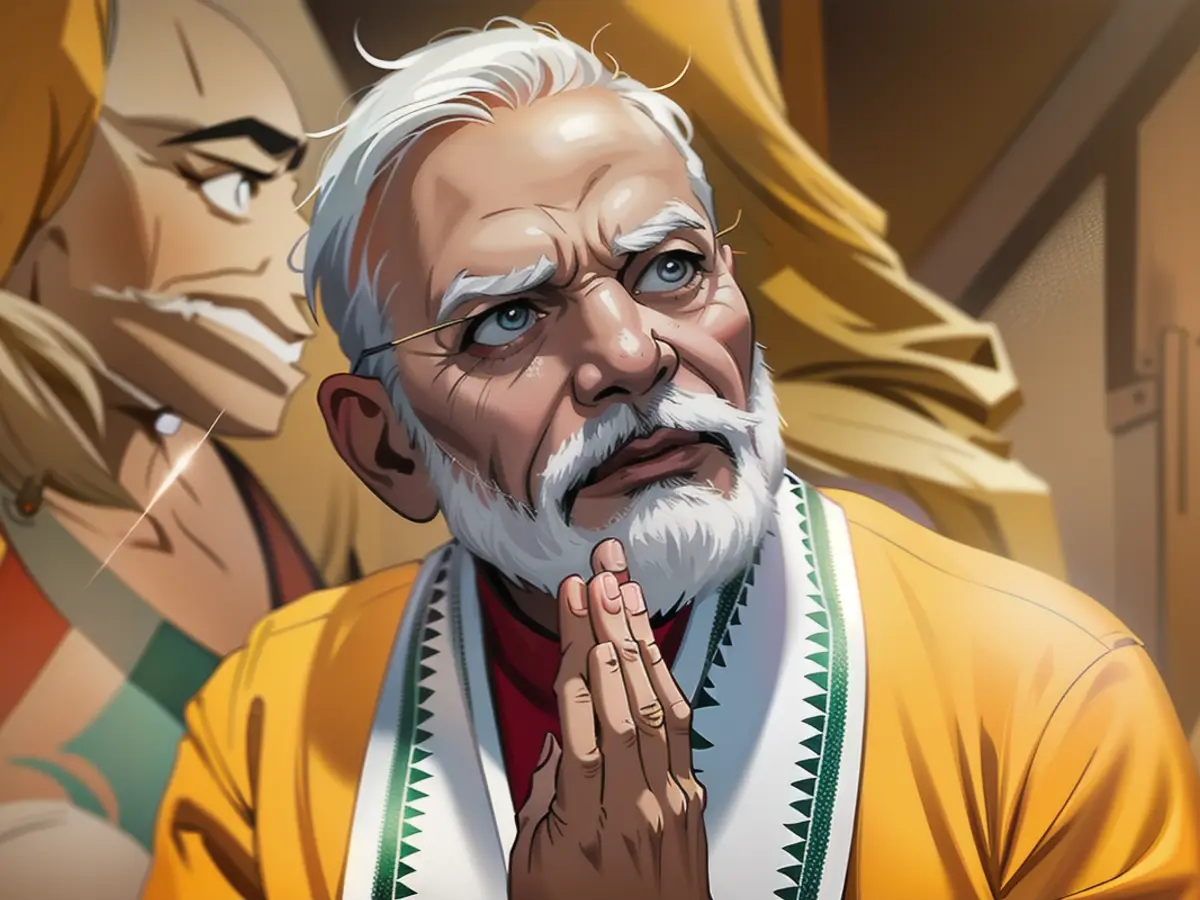Biggest nation practicing democracy. - Stunning Development in India: PM Modi Suffers Poll Defeat
India's Prime Minister Narendra Modi claimed victory in the parliamentary elections, but his coalition took a significant blow. In a tweet on Tuesday evening (local time), Modi stated that the people had once again shown their trust in his government coalition. As per the counting of some votes, the Hindu-nationalist BJP party was likely to be the strongest one, but it might lose its absolute majority in the lower house. This would imply that it would need the support of its coalition partners to form a government.
It was widely believed that Modi would be able to continue leading the country for a third term of five years. However, Rahul Gandhi of the opposition Congress Party refused to rule out discussions with two of Modi's coalition partners. The stock market experienced its heaviest losses in four years due to Modi's setback.
Modi and his Hindu-Nationalist Agenda
The opposition surprised with their strong performance and declared a win for democracy. Modi had raised the bar high for success in the election campaign - his government coalition would need to win more than 400 of the 543 seats in the lower house and increase their majority. However, he failed to achieve this target.
The BJP ran a strong campaign around Modi's personality, presenting him as a powerful leader. He aspired to become only the second Indian state leader, after Jawaharlal Nehru, to serve three consecutive terms. Instead, he now finds himself weakened.
The election campaign was heavily influenced by the Hindu-nationalist agenda of the 73-year-old leader. Modi portrayed himself as India's strongman and aimed to transform India into a state exclusively for the Hindu majority, which makes up 80% of the population.
Muslims and other religious minorities have faced increasing discrimination. Modi even referred to Muslims as "intruders." The campaign began at the ruins of a centuries-old mosque, which radical Hindus had destroyed. Modi dedicated a large Hindu temple there with a priest. Modi's agenda contradicts the vision of the country's founding father, Mahatma Gandhi, who once advocated for a strict separation of religion and state.
India: A Country of Contrasts
Modi came to power a decade ago with a promise to turn the Indian economy around. Since then, the country has changed significantly. Billions of dollars were invested in new infrastructure, with new roads, airports, and railway connections being built everywhere. The economy almost doubled, making India the fifth-largest economy in the world and attracting many investors. The stock markets were booming globally due to India's economic growth, as well as its rapid digitalization and affordable mobile networks. Last year, India even succeeded in a successful lunar landing as the fourth country in history. Nevertheless, there are cracks in the impressive facade.
Millions of Indians cannot find employment despite the economic growth. Unemployment and inflation remain high. Reportedly, 800 million of the 1.4 billion people rely on social welfare. The growth is unequally distributed. The opposition, led by the Congress Party, repeatedly highlighted these concerns - and now seems to have found support.
The opposition performed far better than anticipated. "I am extremely proud of the people in India," said Rahul Gandhi, the leader of the opposition Congress Party. The Indian population has unambiguously demonstrated that they reject Modi as prime minister.
Concerns have been mounting regarding the hollowing out of democracy under Modi. The election commission called the parliamentary election with almost a billion people voting "the greatest democratic exercise in the world," but many are still worried. "If Modi's second term in office is taken as an indicator, a third term would not be good for the long-term health of Indian democracy," said the South Asia expert and political scientist Sumit Ganguly from Indiana University.
Modi has centralized power and challenged the independence of the judiciary and media. He has also persistently pursued the ideological goals of his party with ferocity. The opposition accused Modi of using state institutions to suppress them and pointed to corruption charges against several opposition politicians, who were held in pre-trial detention during the election campaign.
Modi's coalition partners had earlier expressed a willingness to form a new government with the opposition if necessary, taking advantage of the weakening position of Modi's BJP party. Others have speculated that Modi might even be forced to step aside.
Modi attributed any positive developments in India to his leadership and the growing global significance of his country. Germany, the US, and other Western countries are seeking closer ties with India as a countermeasure to the increasing aggression of China. India's neutral stance in the Ukraine war, its purchase of Russian oil at discounted prices, and its close relationship with Russia have drawn criticism.
Read also:
- Despite Narendra Modi's claims of victory in the parliamentary election, his coalition faced a significant setback, with the Hindu-nationalist BJP party likely to lose its absolute majority in the lower house.
- Rahul Gandhi, the leader of the opposition Congress Party, refused to rule out discussions with Modi's coalition partners, suggesting a potential shift in power after the election.
- The election campaign was heavily influenced by Modi's Hindu-nationalist agenda, which included discrimination against Muslim minorities and a focus on transforming India into a state exclusively for the Hindu majority.
- The opposition, led by the Congress Party, performed surprisingly well in the election, with Rahul Gandhi emphasizing that the Indian population had rejected Modi as prime minister, raising concerns about the future of democracy in India.








